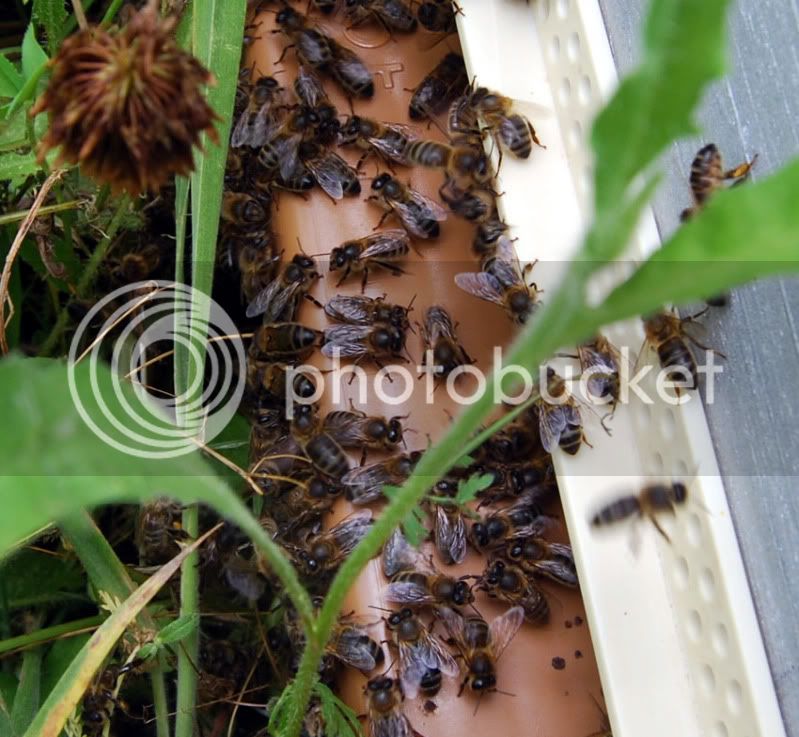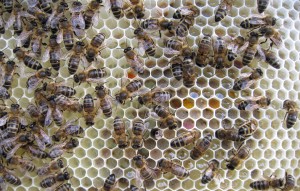- Joined
- Jun 20, 2009
- Messages
- 2,428
- Reaction score
- 2
- Location
- Kingsbridge, South Devon
- Hive Type
- None
- Number of Hives
- 0 - Now in beeless retirement!
I made a trip through parts of Brittany last week on my bike, including a short visit to the island of Ouessant, off the west coast.
On the island I found an interesting programme to preserve the native black bee of the region.
The local association doing this have a very good website (in French) which tells all if you take the time to translate the pages - I used Google translate.
http://abeillenoireouessant.fr/index.php
In summary, there were no honey bees present on the island when in 1978 the first bees were introduced - black bees from the mainland. The lack of bees should not be a surprise - there are virtually no trees on the island and any rocky crevices bees might use as an alternative are on the coast where they are lashed by frequent storms.
The French government seem to have given them help - both scientific, helping them improve the strain of bee and I suspect also financial - they have a full time beekeeper to look after their 150 hives. The island is free of varroa and is now protected from future imports of bees by legislation - providing the sort of protection the Danish Black Bees of Læsø lacked.
They currently raise about 500 queens a year, 90% of which are sold to France but some also go to Switzerland. I spoke to the President of the Association and he saw no reason why they could not sell queens to the UK and at 30 Euros each they seem very well priced.
Ouessant has a climate like the wilder parts of the south west and also probably a bit like the western isles of Scotland.
You can find out a bit more of my visit here:
http://www.crazyguyonabike.com/doc/Brittany2012 Look on Day 6.
This shows some of their hives. Wooden Dadant Blatts on plastic floors. There were also some interesting double hives which I suspect were used for queen rearing - two colonies with a central area for grafts - but I forgot to ask when I spoke to the beekeeper. Someone else will have to go back when the weather is better and have a look inside them!
On the island I found an interesting programme to preserve the native black bee of the region.
The local association doing this have a very good website (in French) which tells all if you take the time to translate the pages - I used Google translate.
http://abeillenoireouessant.fr/index.php
In summary, there were no honey bees present on the island when in 1978 the first bees were introduced - black bees from the mainland. The lack of bees should not be a surprise - there are virtually no trees on the island and any rocky crevices bees might use as an alternative are on the coast where they are lashed by frequent storms.
The French government seem to have given them help - both scientific, helping them improve the strain of bee and I suspect also financial - they have a full time beekeeper to look after their 150 hives. The island is free of varroa and is now protected from future imports of bees by legislation - providing the sort of protection the Danish Black Bees of Læsø lacked.
They currently raise about 500 queens a year, 90% of which are sold to France but some also go to Switzerland. I spoke to the President of the Association and he saw no reason why they could not sell queens to the UK and at 30 Euros each they seem very well priced.
Ouessant has a climate like the wilder parts of the south west and also probably a bit like the western isles of Scotland.
You can find out a bit more of my visit here:
http://www.crazyguyonabike.com/doc/Brittany2012 Look on Day 6.
This shows some of their hives. Wooden Dadant Blatts on plastic floors. There were also some interesting double hives which I suspect were used for queen rearing - two colonies with a central area for grafts - but I forgot to ask when I spoke to the beekeeper. Someone else will have to go back when the weather is better and have a look inside them!







